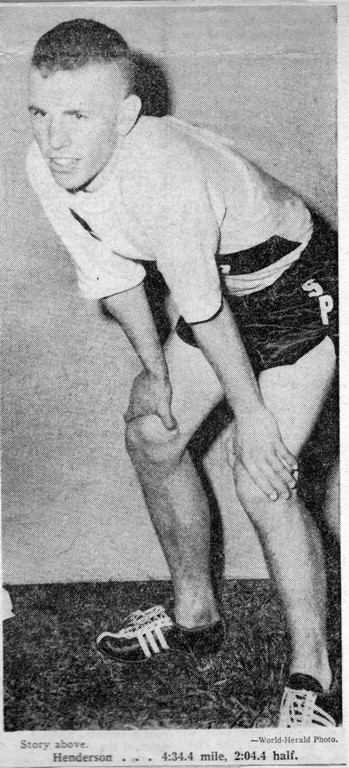Truth be told, I have long admired Joe Henderson. Been friends almost as long. We are talking decades here.
Joe Henderson has pointed the way and touched positively the lives of many people. We are talking many thousands by now.
Found a forgotten review of a remembered book in RUNNING:The Magazine For Thinking Runners. Volume Two, Issue No. Three. Spring 1977.

THE LONG RUN SOLUTION by Joe Henderson. World Publications (1976)
One might call The Long Run Solution the final chapter of a trilogy Joe Henderson began with Thoughts On The Run (1970), and continued with Run Gently, Run Long (1974). Such an identification would be presumptuous and, ultimately, inaccurate. For Joe Henderson writes from the heart and as long as that muscle – made strong by some twenty years of running – continues to function, Henderson will continue to write these personal appeals.
His books are appeals. Perhaps, even cries of anguish. Henderson, the editor of Runner’s World, looks at the politics, the commercialism, the win-at-any-cost attitude which often perverts this sport, and thus his life, and he bemoans its pollution. But he is not apathetic. Just as he runs each day, he writes each day. Henderson sits down every morning and he asks his typewriter for answers.
How can people be exposed to running? How can they learn that running is good, in and of itself? How can we help people see running is something to do every day of their lives? Can we? Will they?
Important questions deserve similar answers, and The Long Run Solution is replete with such responses.
“The challenge in running… is not to aim at doing the things no one else has done, but to keep doing things anyone could do – but most never will.
“Forget the formulas. Trust your instincts. Do what feels right. And if it doesn’t feel right, do something different.”
Henderson may want us to forget formulas, but he offers some rules of his own which be emphasized.
“1. Start without an end in sight. 2. Remember, anything is better than nothing. 3. Let the pace find itself. 4. Run for yourself. 5. Run for today.”
And, lest one think Henderson is no more than the dogmatic apostle of one specific activity, i.e., running, consider these words: “Don’t run because it will be good for you later, but because it feels good to do while you’re at it. If running is not and can never be your play, find another game.”
Contrary to popular opinion, not everything Henderson writes is incontestable. For example, he disavows the usage of mileage totals as a means of running evaluation.
Joe does not know how far he ran yesterdy, last week, last year. “I don’t want to know,” he writes, “because if I kept track of my running this way, I’d be poorer for it. I’d start to feel like a pocket calculator. Numbers would be more important to me than experiences. Worse, I’d always have more mountains to climb. I would look up each morning and see a peak I had to reach, a quota I had to meet. Such hulking obstacle would scare me.”
With that attitude, trepidation would seem inevitable. Henderson’s “hulking obstacles” are of his own making.
Like nuclear energy, the counting of miles can be used to build or to destroy. The deleterious effects of “miles-counting” are a result of the manner practiced, not the procedure itself. The numerical accumulation of mileage is detrimental only if one allows it to dominate, to control his running. A dependence upon sheer quantity can cause a runner to overwork or it can be used as a measure, a guide, by which one’s capabilities can be improved.
Mileage per se can indeed become more and more important to the runner. A week may seem valueless if one hundred (100) miles are not covered; today’s run may be a failure because one’s average was not maintained. The runner can become more a monomaniacal mathematician than an athlete. But this end is merely a manifestation of some psychological disorientation on the runner’s part. After all, running is something we do, it is not done to us.
(To confirm your suspicions, this reviewer admits to keeping both a daily diary – and a chart – in which every run he has ever taken has been annotated. To the tenth.)
Much of what Henderson writes seems repetitious. Of course, I have read everything he has published and, after all, his is a personal style – he has only one life to write about. More importantly, what Joe has to say bears repeating. The man has run for twenty-plus (20+) years; even if I did not agree with Henderson, I would still want to hear what he had learned in that time.
One final note. Despite his protestations to the contrary, Joe Henderson is a philosopher. The Long Run Solution advises the reader about much more than running; it discusses, really, a way of life. Stop and smell the roses, he seems to be saying, and he’s right.

Epilogue. Few years later, Nike bought Running Magazine; first name I thought of was Joe Henderson. Wish we had been able to work together longer. Like to think of myself as an Original Gangster of Running, but Joe Henderson is the real deal.
Another book. He writes every day. That’s a lot of miles.


“Nice of you to say those things way back when, then to recall them now. LRS remains my favorite of my books, even 42 years late.” – Joe